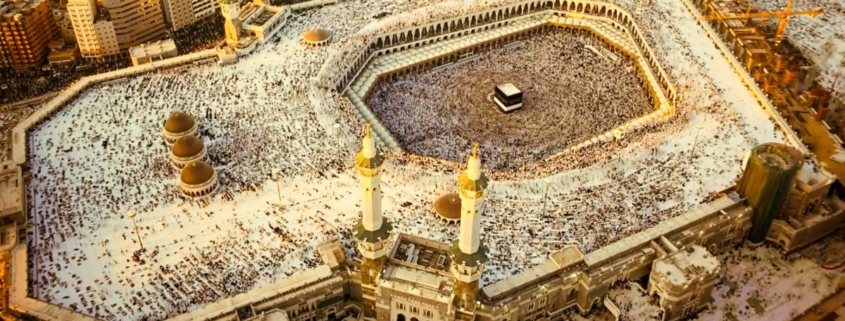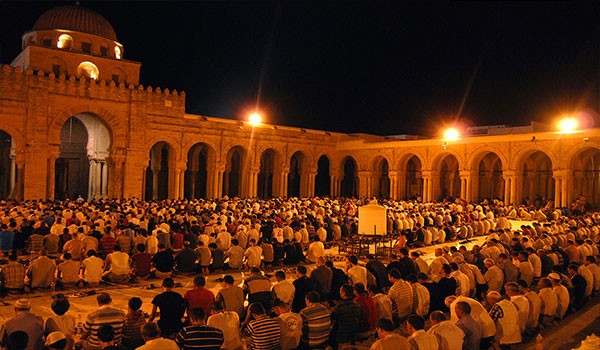The Spiritual Bond: Exploring the Connection of Ramzan with Tarawih
Ramzan, the ninth month of the Islamic lunar calendar, holds great significance for Muslims around the world. It is a month of fasting, reflection, and heightened spirituality. One of the key elements associated with Ramzan is Tarawih, the special nightly prayers performed during this sacred month. In this article, we will delve into the profound connection between Ramzan and Tarawih. Exploring the spiritual significance and rituals that bind them together.
حَدَّثَنَا إِسْحَاقُ، أَخْبَرَنَا عَفَّانُ، حَدَّثَنَا وُهَيْبٌ، حَدَّثَنَا مُوسَى بْنُ عُقْبَةَ، سَمِعْتُ أَبَا النَّضْرِ، يُحَدِّثُ عَنْ بُسْرِ بْنِ سَعِيدٍ، عَنْ زَيْدِ بْنِ ثَابِتٍ، أَنَّ النَّبِيَّ صلى الله عليه وسلم اتَّخَذَ حُجْرَةً فِي الْمَسْجِدِ مِنْ حَصِيرٍ، فَصَلَّى رَسُولُ اللَّهِ صلى الله عليه وسلم فِيهَا لَيَالِيَ، حَتَّى اجْتَمَعَ إِلَيْهِ نَاسٌ، ثُمَّ فَقَدُوا صَوْتَهُ لَيْلَةً فَظَنُّوا أَنَّهُ قَدْ نَامَ، فَجَعَلَ بَعْضُهُمْ يَتَنَحْنَحُ لِيَخْرُجَ إِلَيْهِمْ فَقَالَ “ مَا زَالَ بِكُمُ الَّذِي رَأَيْتُ مِنْ صَنِيعِكُمْ، حَتَّى خَشِيتُ أَنْ يُكْتَبَ عَلَيْكُمْ، وَلَوْ كُتِبَ عَلَيْكُمْ مَا قُمْتُمْ بِهِ فَصَلُّوا أَيُّهَا النَّاسُ فِي بُيُوتِكُمْ، فَإِنَّ أَفْضَلَ صَلاَةِ الْمَرْءِ فِي بَيْتِهِ، إِلاَّ الصَّلاَةَ الْمَكْتُوبَةَ ”
The Prophet (ﷺ) took a room made of date palm leaves mats in the mosque. Allah’s Messenger (ﷺ) prayed in it for a few nights till the people gathered (to pray the night prayer (Tarawih) (behind him.) Then on the 4th night, the people did not hear his voice and they thought he had slept, so some of them started humming so that he might come out. The Prophet (ﷺ) then said, “You continued doing what I saw you doing till I was afraid that this (Tarawih prayer) might be enjoined on you, and if it were enjoined on you, you would not continue performing it. Therefore, O people! Perform your prayers at your homes, for the best prayer of a person is what is performed at his home except for the compulsory congregational) prayer.” (See Hadith No. 229, Vol. 3) (See Hadith No. 134, Vol. 8)
Sahih al-Bukhari 7290
The Essence of Ramzan:
Ramzan is not merely a month of abstaining from food and drink during daylight hours; it is a holistic spiritual experience. Muslims fast from dawn to sunset, refraining not only from physical nourishment but also from negative thoughts, actions, and behaviors. It is a time for self-discipline, self-reflection, and heightened devotion to Allah.
The spiritual atmosphere during Ramzan is palpable, with Muslims engaging in increased prayers, recitation of the Quran, and acts of charity. The objective is not only to physically abstain but to achieve a higher level of spiritual consciousness and closeness to Allah.
Tarawih Prayers: A Nightly Spiritual Journey
Tarawih, derived from the Arabic word ‘Tarawih,’ refers to the special nightly prayers performed by Muslims during the month of Ramzan. These prayers are offered in congregation at the mosque and hold immense significance in the Islamic faith.
The connection between Ramzan and Tarawih lies in the fact that these prayers are specifically recommended during this sacred month. While the obligatory five daily prayers are performed throughout the year, Tarawih prayers are exclusive to the nights of Ramzan. Believers come together in unity, reciting long portions of the Quran and engaging in prolonged bowing and prostration.

Spiritual Significance:
The spiritual significance of Tarawih prayers is closely tied to the belief that during Ramzan, the Quran was revealed to Prophet Muhammad (peace be upon him). Tarawih provides an opportunity for Muslims to complete the recitation of the Quran during the month, fostering a deep connection with the divine revelation.
Moreover, the extended and communal nature of Tarawih prayers. Fosters a sense of unity and spiritual bonding among the Muslim community. It is a time when individuals come together to seek forgiveness, mercy, and blessings from Allah. Reinforcing the collective strength of the ummah (community).
Rituals and Observances:
The Tarawih prayers typically consist of 20 rak’ahs (units of prayer) and worshippers. Can choose to pray an additional eight rak’ahs known as the Witr prayer. The nights of Ramzan are marked by a tranquil and serene atmosphere in the mosques. The melodious recitation of the Quran by the imam (prayer leader) adds to the spiritual ambiance.
Conclusion:
In conclusion, the connection between Ramzan and Tarawih is deeply rooted in the spiritual fabric of Islam. Ramzan, with its emphasis on self-discipline, reflection, and devotion, sets the stage for the profound nightly prayers of Tarawih. Through this spiritual journey. Muslims around the world strengthen their connection with Allah. Their community, and the divine revelation of the Quran. As believers come together in prayer and reflection. The bond between Ramzan and Tarawih becomes a powerful testament to the enduring spirit of Islam.








